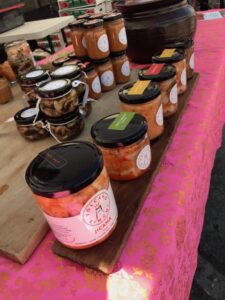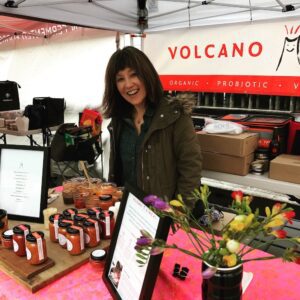I had no business background but I jumped in anyway, and thankfully I have learned a lot along the way and the business is now growing.
An Interview with Aruna Lee, a Femigrant from South Korea. She owns a small business “Volcano Kimchi” and sells home made kimchi.
Tell us a little bit about yourself. Where are you originally from? When did you come to the USA?
I grew up in South Korea, and was raised in a Buddhist temple by my teacher from the age of 6. After high school I entered the monastic order and enrolled in one of the oldest all-female seminary schools in East Asia. I spent the next 10 years as a Buddhist nun, living mostly in the countryside and developing in my practice. I left the monastic order in 2000, and shortly after came to San Francisco. Apart from my husband, I did not know anyone here. However, I am happy to say that the time I am here I have made San Francisco my home.
How did the idea for your business come about?
I was working in media, for a non-profit here in San Francisco. In 2014 I left that position and spent the next year trying to figure out my next move. In that time, I began to see a growing interest in Korean food and especially in “kimchi”. I also began to really miss the kind of food that I grew up eating in the temple, which is vegetarian, of course, but also really fresh-tasting, clean and made from all-natural ingredients usually grown or harvested right at the temple. I guess sort of just occurred to me at some point to begin producing kimchi. I had no business background, but I jumped in anyway, and thankfully I have learned a lot along the way and the business is now growing.
What is an accomplishment that you are proudest of?
I’m proudest of the people who come every week to buy my kimchi, or some of the sauces or other products I sell at the farmers market. I have developed a real and meaningful friendship with a number of folks, and am happy to know that because of my kimchi they are able to enjoy a delicious product that is also good for them.
What is the most difficult situation you have faced when you opened your business and how did you solve it?
I think the hardest part has been figuring out how to scale up. Kimchi is labor intensive, and it also requires some skill. There’s an art and a science to fermentation, and if someone helps with production but does not understand that it can really affect the product. So for me, now that the business starts to expand a little, I am trying to figure out the right time and the right people to bring on board who can help move things further along. I do not know that I have solved it yet but I am confident I will.
When one door closes, another, better door opens. Everything has its own time.
How has being an entrepreneur affected your family life?
Well, it is a kind of a family business. My son created the name and the logo, and my husband helps here and there with communications. He also spends every Saturday with me at the market. In some ways, it is brought all of us closer together. We all want to see, it succeeds. But it is also meant less time with our son. Those Saturday morning breakfasts together are a thing of the past, though he does not spend Saturday mornings with his grandma. So that is nice.
What have some of your failures been, and what have you learned from them?
Last year I tried to open a brick and motor store in San Francisco. An opportunity appeared that at first, it seemed like the perfect fit for me. After several weeks of preparation and some major purchases the whole thing fell through. The owners of the space changed plans for how they wanted to make use of it, shifting away from food and toward opening a book store. While I was disappointed, in the long run it turned out to be the best thing that could have happened, because not long after an opening at the Ferry Plaza farmers market came my way. Honestly, looking back, what seemed a good fit at the time actually was not? I guess the lesson for me here is that when one door closed, another — in this case, better — door opened. Everything has its own time.
How do you motivate yourself and stay motivated?
I am constantly visualizing. I believe it is important to maintain a positive outlook, no matter what the challenges are. That is not always easy, and there are a lot of challenges. However, I work on it; I listen to motivational talks online or read books that offer simple ways to keep your spirits up.
What is your greatest fear, and how do you manage fear?
I don’t have much fear in general… but I do have a fear of public speaking. I do not know if I have managed it, but I have done some and people told me they liked it.
What do you feel whether there is the major difference between entrepreneurs and those who work for someone else?
 I think there is a reason that immigrants, and especially women immigrants, often become entrepreneurs. We come to a new country and often have to fend for ourselves. We struggle with language, with new cultures, but we also carry with us traditions that Americans are hungry for. So, it makes sense that we create businesses that use that capital and allow us to dictate things on our terms.
I think there is a reason that immigrants, and especially women immigrants, often become entrepreneurs. We come to a new country and often have to fend for ourselves. We struggle with language, with new cultures, but we also carry with us traditions that Americans are hungry for. So, it makes sense that we create businesses that use that capital and allow us to dictate things on our terms.
What are your future plans and where do you see yourself and your business in 10 years?
My goal is one day to open a small “banchan” café. Banchan in Korean refers to the many small dishes you get during a Korean meal. It can be all kinds of things, from pickled vegetables to meats, fish and eggs. You can buy banchan at a Korean market, but it is often not made very well. I would like to open a shop where people can buy a selection of different, quality banchan that they can either eat there or take home. I always say, with the fridge of banchan you always have a delicious and easy meal at your fingertips.
My biggest dream is to have Volcano Kimchi banchan stores in different major cities around the country. I would like lead “kimchi making’ classes and spread good bacteria far and wide.
What three pieces of advice would you give to Femigrants who want to become entrepreneurs?
Have a vision and do not compromise. Chances are there are others who share that vision and if you keep at it you will eventually make connections.
- Be persistent
- Stay positive
Do you have any favorite quote that you think might inspire Femigrants?
“Whatever the mind of man can conceive and believe, it can be achieved” Napoleon Hill

